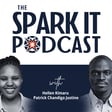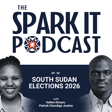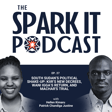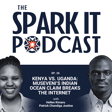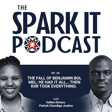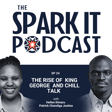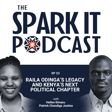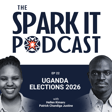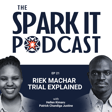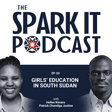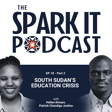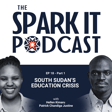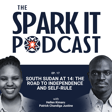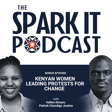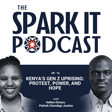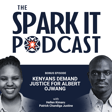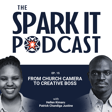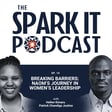Become a Creator today!Start creating today - Share your story with the world!
Start for free
00:00:00
00:00:01

Finding Your Voice: The Power of Speaking Up
In this episode, Hellen Kimaru dives deep into the journey of finding her voice. She shares how she grew from being a quiet, unseen child to a confident leader, poet, and public speaker. She talks about how reading books, performing poetry, and taking leadership roles helped her express herself, build confidence, and heal from childhood trauma.
Through engaging stories about childhood competitions, persuasive arguments, and self-discovery, this episode will inspire you to embrace your voice, step into leadership, and use storytelling as a powerful tool for change. Tune in for a conversation filled with lessons on resilience, self-expression, and the power of words!
Transcript
Introduction to the Episode and Theme
00:00:00
Speaker
Welcome to yet another episode of the Spark It podcast with Patrick C.J. and Kimaru Baby. Today we are going to discuss a very interesting topic. How to find your voice. Finding your voice. That's going to be the topic we will discuss today and the major question we are answering is how can you find your own voice?
00:00:30
Speaker
And Kimaru baby, as usual, really good to have this conversation with you. How are you doing? I'm good. I'm excited, of course, as usual. I can't wait to see what to we definitely unveiled from this conversation. So yeah, I'm okay. That's nice. Yeah. You are shining bright like a diamond.
00:00:58
Speaker
You're funny. Thanks, though. Yeah, I tried.
00:01:05
Speaker
la Thank you. Yeah, for sure.
Kimaru's Journey of Self-Expression
00:01:09
Speaker
So um so you recently published an article on your website, a very interesting article, actually, titled, When a Young Girl finds her voice. he I read it through it and and I found it fascinating. Okay. Yeah, so I actually thought that that would be something that we could chat about today. um In your article, you say that as a child, who um you wear
00:01:58
Speaker
a quiet child who prefer being alone. That's how you describe yourself in the article. And by the way, for someone who does not know where to find this article, you can go to helenkimaru.com.
00:02:19
Speaker
and <unk> dot come You'll find the article when a young girl finds her voice. So yeah, you describe yourself as a quiet child. What do you think contributed to that and how did it shape your alias? I'm just curious.
00:02:45
Speaker
ah Yeah, as a as a child ah if somebody listened from there, you know the previous episode we had i I am from a family of nine. I'm like the middle child literally Yeah, so I feel like growing up um and especially with what happened with our family ah it's like you're just there you're the middle child and And now these whole shenanigans happen. We are separated as children. They live with their relatives and all that. At that point, you're already so traumatized. You used to be quiet. Now you even become even more quiet. There's nothing really to say. It's like you're processing your life and what has become of it. And I think that's how I ended up being like a really quiet child, especially when I was in primary school. It was just me doing my own thing.
00:03:38
Speaker
And ah you know just focusing on the things that really mattered at that point, yeah. That's you know how I would describe it, actually. Right. Well, yeah that that is interesting. And specifically, I'm just wondering, how did be a quiet child share your ideas?
00:04:02
Speaker
oh I don't know what to even say. I think it was more of I don't know I think you at some point you actually feel like ah people don't even know you exist you know the way you could be in a room and you're just in your own world doing your own things Like at home, at some point, maybe even on Sundays, my sisters would, we would go to church and then from church, everybody has probably gone somewhere. They're hanging out with their friends. And for me, I'll just be, I'll go to church, get from church and go direct home. I'm just there. I'm seated with my books. I will just keep digging deeper. I was always finding something to read.
00:04:44
Speaker
always doing my own things yeah for me i was always buried in something i feel like i even at some point maybe people didn't even even you know i don't think they were paying even attention as much although even like their own little bubbles at that point yeah but that's that's what i was doing i was always alone doing the things that i thought mattered at that point and for me especially as a young child schoolers mattered what mattered the most as i said in the other episode i was trying to prove a point i was like yeah I'm gonna laugh. I was reading, I was always reading. I remember even um in primary school, we had like this little library at school. It didn't have a lot of books. And I remember when I think I was either in grade five or six, I became, I was like in charge of the library. And I read every single book in that library, including dictionaries.
00:05:39
Speaker
And the clapidias. Yeah, that was me. That was my life. Reading, reading, reading, reading. Yeah. Wow. that That is interesting. Yeah. ah so So being the mid child of nine was a factor in you being an introvert, a choir child.
00:06:05
Speaker
Yeah, I think it was at this point, because I mean, like, my I feel like my older sisters and brothers at that point, they had already kind of sort of found themselves, they're doing their own thing, or they have their own little lies. And then then now there's other kids who are like behind me.
Role of Reading and Acknowledgment
00:06:25
Speaker
And, you know, yeah, I think it did contribute. You're just there. Right.
00:06:32
Speaker
and you You say that ah you felt unseen and sometimes you felt unheard. What was that like?
00:06:49
Speaker
I think at this point as a child, I think feeling unseen and unheard was mostly contributed by, I can't say my family just chose not to see or not to hear you as much as you would want to. It was because of that traumatic traumatic experience we went through. And at this point, as ah you know, we kept moving and all that before we were resettled. And even when and you are resettled, it's like you are children who are forced to become adults in your own little way, because you have to do stuff for yourselves and all that. So I think even the people who are not seeing me or hearing me as much was because, as I said, everyone was in their own bubble. You're trying to process what happened to to us, and then you're also trying to figure life. You're trying to balance if if it was for like our older sisters and brothers,
00:07:43
Speaker
ah trying to figure out life and balance maybe finishing school and also like you know doing stuff for us that a parent would do right and stuff like that so it was more like surviving honestly and at that point you don't feel like you have um i don't think at that point you feel like you have somebody who you could be like hey hey i need this hey i need that because everyone you know we are in our own little world and everyone was trying to figure it out so I think that one was not like by design that people just decide like we're not gonna you know be there for her in that way it's just that all these chaos that happened they kind of shaped that and that's how it ended up looking like you know you're just there
00:08:26
Speaker
And I think the only place I would feel like I was seen in that way would be school, because as I said, I was top of my class and all that. Yeah. So I was always top of the class. So at the end of the day, you become everyone's favorite from the teachers, the students. Yeah. At that point, I guess now you, you kind of like hold on to that. Cause at this point, you know, here people see you, they know you, they know your abilities and what you can do.
00:08:55
Speaker
Yeah, so you are shining. Yeah, you're on top of the world. Yeah. Yeah. And and so how is that important, being seen or heard?
00:09:09
Speaker
wow that's a really good question i think for especially for kids okay as an adult if people don't see or hear you sometimes there's you know you can always find ways to make sure they hear you for example but as a child not being seen or had i think that can be really i don't know it can be something that shapes you in a way that if you grow up in that. It's like you're in a bubble where you feel like you're in your own world. it can be actually Actually, I think what I'm trying to say is it can be very isolating.
00:09:47
Speaker
right And why I think it's important to be seen or heard, like, for example, right now, my sister has a four year old child. And this kid, there was another day we were having a call. And um so my sister has, I don't know how they even got to this point where The child knows that, I don't know when it is, when they are, they have like zones. They have zones where they go into, like if they're mad, that means they're in the red zone. If the ACG ward frustrated, they could be, I don't know, in the yellow zone, something like that. And then if they're happy, they're in the green zone.
00:10:28
Speaker
Yeah, something like that. So for for him, I feel like the way my sister has raised him him up, he's so seen and had because when he's frustrated, he knows he's frustrated and maybe he's in that ah red zone. And my sister has also taught him, like when you're ah in the red zone, how are you supposed to handle it?
00:10:49
Speaker
yeah I can imagine at that age, at only four, he already feels seen and heard because he feels frustrated, he knows how to handle it and what he should do because the last time he was in my house, I he was like i don't know what happened and then he was like, I'm in the red zone.
00:11:06
Speaker
He's a happy child. He's like, I'm in the red zone. So when he's in the red zone, he walked into my bedroom and you know, he sat there for a few minutes and then he came back and then he said, he's okay. Now he's in the green zone. And then now he tells his mom, but you know, you took me to the red zone.
00:11:27
Speaker
So I think that ah to to answer your question, the importance of being seen or had, especially if I was to use that context of my nephew, it's that true you you you grow up knowing even how to self-regulate.
00:11:42
Speaker
in terms of what you feel or even how to like handle your emotions and to also speak out when you're going through something or maybe when you're feeling like people are stepping on you. Yeah, so to to feel seen and heard is to be able to ah probably even be in a position to express yourself, to let know to let people know how you feel about whatever is happening around you and you know stuff like that, yeah, that's what I would say.
00:12:12
Speaker
That is interesting. So you said you were reading books at an early age. Yeah, you know, you were a quiet girl and so for you,
00:12:32
Speaker
readings like reading books became your thing it was like the thing you did probably the most i know you know but for so you you you did say that uh you started reading at an early age you know you were a quiet child and so you had a lot of time to just spend reading books and things like that. And I'm just wondering, how did you get introduced to reading books and what role did your aunt play in that?
00:13:18
Speaker
interesting yeah so when we moved ah from Kerizio to Nakuru I as I said I started living with my auntie ah and so my auntie was a teacher at that at that time and she was she was so nice I remember in her house there was like this big dining table we would have our dinner and once we are done we would wrap the table and then she'd be like okay sit down and then she would give us like um story books and she would be like okay so i wanted to read this short story and yeah so you would sit down you'd start reading and then after that she i think by then i had not learnt how to read so well so she did teach me a few things and then i caught up and then now uh after i would read the stories she would be like hey
00:14:05
Speaker
she'll come you're done okay so tell me what was that story about so you would go on and on and narrate to her what the story was about and then she would be like okay so what was the lesson from that story and then i'll definitely tell her or we would tell her what their story this they were given different story books with my brother so everybody would tell them like what the lessons were for them from that story and then after you're done she's like very good and then she'll be like yeah now you can go to bed so i think for me uh her cultivating that reading culture and we did it like every single day every single day and especially on the on school days
00:14:45
Speaker
yeah so after we left and now relocated and started living with our mother for me I had already I was so curious I just felt like I needed to read I just need and i I felt like at that point I had a capacity to absorb a lot so yeah I read and read and read and I remember at some point I think because I became a representative of the library at some point I read books in that library I read encyclopedia I read the dictionary. yeah the I I read there is this literature books we do in high school. We call them set books in Kenya. So at that point I read some books like Banggu Gyawatyong or like there was this one in high school we did called The River Between. So I read that set book in primary school. I think that I was in it and in class five or six.
00:15:40
Speaker
So but by the time I'm getting to high school and that's the book we have for literature class, yeah I was like, but I read this. I was ready. Yeah. So that's how I read and read. Honestly, I did read a lot as a child. I was always reading. Wow. That is impressive. And you said you read the whole encyclopedia.
00:16:08
Speaker
Yeah, we had an encyclopedia. Oh my god. How old were you? I at this point, I was in the 12th or something. I was just reading. It was there. For me, any material. I would read like newspapers. It's like I find a newspaper in your house. I'm the one who's seated there. You would think I understand the politics of the world or something. I'm reading the newspapers. I'm reading magazines. I'm reading. And even those days also, we used to have like lyrics written in the newspapers for songs.
00:16:40
Speaker
you know Yeah, there's never there was no YouTube but then at the time. So I would even catch the lyrics for the songs and paste them on the books. I loved it. I read and read and read.
00:16:56
Speaker
yeah yeah That is very interesting though. h Yeah. to to viema to read the whole encyclopedia as a child is that it's an amazing thing yeah i was curious a curious child for sure curious you was yeah okay so you got introduced to reading at really an early age
00:17:32
Speaker
who by your aunt. And that introduction helped you build a reading culture at really an early age. And I'm just wondering, and how did do that impact your ability to express yourself maybe as a child and now as an adult. Oh wow. I think, oh wow, that's good. That's good. I think actually reading expanded like my my mind.
00:18:18
Speaker
You know you you read and read and you have all these information. I feel like at some point I had travelled the world through books. I read there was these books called the Hadi boys or something like that. It was a series of books I read including those and it was it was super super interesting and how that kind of shaped even um You know, ah what I became as a child in terms of expression was,
00:18:48
Speaker
ah no, how do I even put it? What's the word? um Like first, it helped me be able to articulate myself. I could sit you down and tell you a story. I'll be like, but this is really what I want.
00:19:08
Speaker
And I could, it kind of prepared me to sort of make a case for myself, whatever it is. Like if I want something, reading opened those doors for me. It's like, it made me ah realize that you can express yourself in a certain way. You could even tell a story. You could do all the, you could, like you can explain yourself, not just superficially, but in a way that you can actually convince people. So it taught me, it taught me that and kind of prepared me, you know, to also in the context of like becoming a leader, because I could sometimes I could put myself in the whatever's of the characters I was, you know, you put yourself in their scenario, you would see a character in a book that you admire, and then you're just there you're like sometimes you even pretend you're that person.
00:20:01
Speaker
and yeah like um you know you know so even i think even as as ah When I was in primary school, I also became like a prefect at school. I used to be the monitor for our class.
00:20:13
Speaker
you know Teachers find you like, I don't know, they fancy you. You can articulate yourself. You can talk in a way that maybe other kids are not able to express yeah themselves in that way. So they find it easy to, you know, they want to talk to you so that you can also talk to your fellow students. They can pass those messages through you.
00:20:34
Speaker
yeah I think that's how like reading sort of prepared me to, you know, I could embody characters in their books and I'll be like, yeah, I'm that person. Yeah. That's actually nice. Yeah. And and honestly,
00:20:53
Speaker
I think I can see the value of being introduced to reading holy me to is a or comic books or even some books or something like that. I think it's like a very good way to cultivate a reading culture in children. who and Yeah, from an early age.
00:21:21
Speaker
her Yeah. And I think just like you have said it, it's really good. it It helps them not just at that point, but even in later time in their life. Yeah. who yeah
00:21:40
Speaker
Wow impressive. It was really good. Reading is good and also it kind of as I said it takes you to places you've never been but just there and you are reading stuff and you imagine yourself in a village or you imagine yourself in a city. Yes yes absolutely. I know yeah still not that crazy. Yeah and honestly like you said it really has this way of expanding your mind Mm-hmm. Yeah, you you start to look at your surrounding and people around you in a really different light completely. Mm-hmm. Yeah and Fantastic. So I I wanted to so you mentioned mm-hmm that
00:22:31
Speaker
um You were living in literature, and then you moved from there to a new place, Nakuru.
First Public Expression and Growing Confidence
00:22:45
Speaker
In your article, you said, when you guys moved to this new place, you joined the Presbyterian Church, and you performed a solo verse.
00:23:03
Speaker
but A judge. who And I'm just wondering like, what was that and what did that moment feel like?
00:23:18
Speaker
well and and And was that like your first time a performing in public? Oh yeah, it was. ah So before you even moved, you were members of Presbyterian Church. Now we moved, but when we moved to Nacun, we went to another one. Yeah. So the very first time I performed a poem ah was through, we used to have these church competitions where like the whole like parish
00:23:50
Speaker
would come together like different paparazzi was made of like almost five or six churches and then we would literally compete there would be like folk songs there's poetry there's um There's a drama and stuff like that. Yeah, so the first time I did perform, I don't even know who came up with this crazy. out Right now I can call it crazy. It's a crazy idea. They wrote a poem. um And this poem him was exactly so close to what had happened to us ah before we, yeah, so that whatever made us move from Kericho. And
00:24:29
Speaker
So they chose me. They were like, yeah, she has potential. i like Again, I don't even know who also decided that I should be the one reciting this poem, but that was like really my first poem. And that poem, it was crazy because it had like It was almost so close to exactly what we had gone through. And I remember those teachers at the time, the teacher who was training us was also a teacher in my primary school. So ah we would go, that we used to have this session after lunch, we would have like two classes, and then that we would go for games. Then after games, we would go back to class to do like ah a session, ah like, ah you know, you have your own study time, and then go home.
00:25:14
Speaker
yeah so for us when we were having these competitions because she was a teacher both at church and in the school she would like us for permission from the head teacher um and then us after the the sessions after lunch we would go instead of us remaining at school we would go directly to church to what is he called to practice so i remember one of those days she calls me she's like we were at school she's like tomorrow i don't know why you are struggling with this poem
00:25:45
Speaker
she's She's like, this poem, this feels like a real story. And you guys went like through something similar with whatever i is written in this poem. I want you to tap into those emotions.
00:25:59
Speaker
It was crazy. So she tells me I wanted to tap into those emotions of, you know, what you went through. So tell me why I'm in her office at school and I'm there. She wants me to cry because the poem is bad. It needs you to write that you can show the emotion. And and then of them I channeled the emotions and, you know, it it it came so naturally. I'm like, fire, fire, houses are on fire. It was,
00:26:27
Speaker
can laugh about it now yeah but i did channel the emotions and eventually i even have a photo somewhere um i eventually we went for these competitions i think i was either i was top three i can't remember which of the people but i was top three uh using you know that poem you know and it was crazy but so that was like the very first poem i did and I know initially I was told to channel emotions because of what I was going through but I think that was sort of like a very pivotal moment because it showed me that I subconsciously I could use words
00:27:12
Speaker
to you relate like how I feel and I could tap into them and you know and maybe I it it it kind of helps you to ease out that like maybe pent up feelings like you're feeling something bad you're frustrated and then you can just use words and then if you are angry you are fine after you are done.
00:27:33
Speaker
I think that was what now the poem kind of, you know, brought out. And after that, it's like, I just wanted to do poetry. It's like I was drawn to it even without knowing, yeah. Wow. That is, that is super interesting. Yeah, you were doing awesome things as a child.
00:28:01
Speaker
I honestly can't remember what I was doing until.
00:28:09
Speaker
oh man I don't know. Yeah, I was probably playing so good. So I really don't know. That's good too. Oh my God. That is really nice. um so was was performing this poem at the Presbyterian Church. The first time you realized that poetry for you was more than just words, that it was a way for you to process emotions and to make sense of life.
00:29:00
Speaker
I think at this point I would think so but I would think it's something that happened ah sort of not necessarily intentionally but maybe on a subconscious level because like from that particular point it's like I just started doing more poetry. Like if there's ah there's something happening, there's a competition, CG, they want you to do something, whether at school or at church, I'll be like, yeah, I volunteer as tribute. right right yeah Like I was just there. So I think also maybe also watch Cultivator, that also was the teachers. I think they also saw something in me. and they And I think at this point they're like, yeah, this girl is gifted. she can actually do this, yeah. So I think for me it was maybe on a subconscious level and then for my teachers, for them they now saw like the potential, they them I think ah where the from where they start maybe at this point I would think they'd be like, there maybe be they were telling themselves, yeah, she's really good. We should probably give her the next one.
00:30:08
Speaker
Yeah, I would think that was probably what was happening. But for me, it was sort of, all I think, almost on a subconscious level. Yeah. Right. Wow. That is fantastic. So looking back now, who you know, you you have worked on, I don't know, hundreds and hundreds of poems.
00:30:35
Speaker
ah Do you think that poetry helped you heal from your childhood trauma?
00:30:47
Speaker
Yeah, I think it actually did because um what happened was now I did a lot of poetry when I was in primary school. By the time I was getting to high school, it had become like a lifestyle. It was like because in high school, there was these competitions, they are called Kenya Music Festivals.
00:31:07
Speaker
where again, that you would do poetry. There could be like these solo busses, choral busses used to be like for ah groups of people. So for me, I would do actually both. So when I got to to high school, and they as in the second a music festival, we used to call them KMF in short, I'd be like, hey, I am not missing out. So all the way from, for one at this point, I had really embraced that persona of the poetry, because I felt like when I was on stage it felt like I could embody what the poem was about. I could become a tree if the poem is talking about a tree, like it could be anything. I think poetry for me from that point actually it did help me heal in the context of apart from the poems I was reciting because maybe somebody
00:31:59
Speaker
has written and we have to do this game and all that for me now I started writing and I started writing when I was in primary school, upper primary school but I wrote and especially in high school I wrote and wrote I have like a lot of I have I don't know almost five books from high school where I have written poems of our poems of our poems of our poems and the other day I was going through those poems again I would think again subconsciously yeah without no intention of thinking that they were helping me heal but I think now looking back I think they were helping me heal because the other day I was reading through those poems and the stuff I have written there it is deep like really deep it's like you can feel like at that point I have channeled a lot
00:32:51
Speaker
Like a poem for me was not just superficial on surface level things. It's like I was digging deeper, deeper. I would write about like very emotional stuff, very traumatic things. And now looking at those poems now, I feel like they did help heal a part of me because I was i would go, I would dig deeper. I would write like very intense emotional things. So yeah.
00:33:20
Speaker
if you are talking about healing then i think they did help heal a part of me honestly because i wrote and wrote and wrote and wrote oh yeah i kept writing i still write yeah wow and it's it's amazing really like for me to see how you were constantly evolving as a child you know from
00:33:48
Speaker
a child that feels that is quiet, feels unheard, seen to performing now in the church and developing this strong confidence and everything. And maybe actually, when you look back now, you competing, for example, in the Kenya Music Festival who and other competitions that you've been to, where you perform the poetry. When when you look at this now, what what what did the they teach you about self-expression and confidence? Oh, wow. Yeah.
00:34:44
Speaker
oh wow that's interesting oh wow self-expression and confidence oh wow i think ah poetry for me like opened a door to speak my thoughts in the context of self-expression like at this point i could say anything because i remember even in high school We used to have random people coming to school and they would tea the the the director would ask us to write poems and maybe even perform for visitors in our school. So I think in the context of self-expression, I think poetry taught me that I can write anything. Whatever is in my mind, I can speak up my mind on
00:35:28
Speaker
different topics, be it political, be it like I'm going through a frustrating moment, be it that I'm happy, be it that I feel like I can dream, like I want to write about my dreams. So Poetry taught me that I can be anything and I can embody anything and I can explore the deepest of things and write about them.
00:35:52
Speaker
without fear of, you know, anything. And then about confidence was like, it taught me that, um it it gave me a stage, a stage where I could be, you know, I could express myself and, you know, I mean, at this point you are standing in front of crowds.
00:36:14
Speaker
you have to ah speak to them, convince them. And you know, you used to have like a panel of adjudicators or something that will probably select the winners. You have to be convincing. You have to convince the crowd that you do feel, say for example, you're speaking about a certain injustice. You have to show from your facial expression, from your intonation, from all these things. So it gave me,
00:36:41
Speaker
um Like doing all these things required like lots of confidence. So you have to master that courage to stand before a crowd and be as convincing as possible. So I would say in terms of confidence, like all these stages, they gave me a platform to grow in terms of ah the confidence in me, like grow my confidence. Every day was that a learning lesson and every day was ah an opportunity or every stage was an opportunity for me to show the world that you know what, I can stand in front of you, I can command the stage and I can make you listen to me.
00:37:29
Speaker
yeah yeah so it kinda I don't know it just there was just that vibe about it and just knowing that you are just standing there and everybody is listening and hearing you and all these things you become confident it keeps building you and you it prepares you for a lot of things that you would never have thought yeah so that's what I would say about that
00:37:58
Speaker
What? Oh my god. I really think that, you know, um you you you you were what would be in my ah neighborhood,
00:38:13
Speaker
the coolest kid. He's just bright and has everything, like, you know?
00:38:22
Speaker
ah heaven data And talking about you using that stage to be able to express yourself in a way that is able to get the message that you would like to pass across in a way that is convincing. o And I really think that It's interesting how poetry for you has been able to develop all your soft skills. Yeah,
00:39:05
Speaker
yeah and not even only like your soft skills in terms of being able to be convincing or persuasive, but confidence and so many other things.
00:39:21
Speaker
So maybe speaking about being convincing or persuasive. So I came across this piece in your article where you basically convinced a school director to let you compete as a senior.
00:39:45
Speaker
and It was against the school policy, but you were able to convince the director to break school policy for you. Could you tell us what was that like and where did that determination come from? Because I think for me as a child, ah her I don't know if I could have mastered
00:40:18
Speaker
Did the determination to do that? No, I think as you said like poetry gave me a voice. It showed me like there's things I could do that sometimes you think you're limited but it makes you know that You are not limited, you can do so much. So, as you said, our school had this policy as a senior in Form 4, you could not go for these Kenya music
The Role of Mentorship and Leadership Development
00:40:44
Speaker
festivals. They would consider it like a waste of time. I mean, you need to be studying and preparing for like a big end of year exam that determines whether you go to the university or not. Yeah, so.
00:40:56
Speaker
ah I think at this point, I loved, loved poetry. Poetry had become like a big part of my life somehow. I don't even know how know how I got there. But at that point, I got to the director's office. I was a captain by then, and so she would listen. But still, I think even if I was a normal student at school, she would have listened. it it For us, it took our school um used to ah encourage us to speak our minds and to just stand up for yourself so i remember when now i go to her office i knock and then i'm like hey i want to talk to you for a minute she's like yes kimaru go ahead
00:41:37
Speaker
She was a very strict lady. And then I'm like, ah so um I know we are not supposed to go for these kind of music festivals, but for me, I would actually want to go and I want you to approve it because um I'll be doing us all of us. And for me, ah in terms of us all of us, there's nothing much I need I don't need time to, you know, when you do like ah a choral verse, which required you to be in a whole group of people. Most of the times it used to be like eight, 10 people or something like that. You need that time to go practice together because you they needed to be like a lot of synchrony, whether it's with the intonation, how you deliver and all these things. But with us all of us, I was like, by the way, Madam Director, um I can practice this solo verse in the shower.
00:42:24
Speaker
I can practice it in the field when I'm running. I don't need any extra time to actually practice these and I have done these over the years and I know I'm so good at it. So please allow me to go. I feel like It will not interfere with my studies because it will not require any extra time to do it. I can do it anywhere. I can do it when I'm working from the dormitory to the class. I can do it when I'm running. I can do it in the shower. I can do it wherever or even when I'm planning to sleep, I could be practicing even in my head. At this point, I think she was like, nah, this girl, please go.
00:43:07
Speaker
yeah so she did um she did allow me to attend the canal music festivals when i was in form for and i was so glad i did go trust me if i show you the certificates i have for attending canal music festival every year i have like a lot of certificates the other day i was looking at them i was like hey if these certificates would be opening any doors for me right now i'll be so fine in my life because I have a lot of certificates from Kenya music festivals, by the way, every year I had certificates, either I was position one, two or three, or maybe I'm given another one for participating or something like that. So yeah, I went, I attended the Kenya music festivals when I was in form four. I can't remember which level I got to because there used to be like a local level, provincial level, and then the national level. I do not remember exactly which level I got to, but I did attend.
00:44:01
Speaker
which for me was very significant considering that they never allowed it. Wow. yeah You know, and you were really persuasive for a child and a high schooler. I know.
00:44:22
Speaker
I think it's the passion when you're so passionate about something and you believe in it so much I feel like it's very easy to convince whoever it is that you need to convince you know yeah so it's the passion and how you get to express yourself and how confident you are with whatever you are telling them at this point ah me yeah so I think I believed in that too much so Wow that is really interesting and speaking about that yeah so you went from being a quiet child to being a school captain ah huh where you are leading and speaking to entire assemblies
00:45:19
Speaker
What was that transition like for you? I think at some point it felt like it was insane. When I got to high school I think some of these things also sometimes as I said it takes other people to see like they're potentially new because when I got to high school In our school, we used to have like, if you get to form two, you become like a sub-prefect. In form three, you are a prefect. At some point, that you when you graduatedge to you graduate it to a sub, no, um senior prefect, and then in form four, you become a captain. So I think in form two, somebody saw their potential in me. yeah I think there's, you know, sometimes people see things sometimes you might not see.
00:46:06
Speaker
Yeah, at this point, I don't think even I was still like loud. I think right now I'm louder than I used to be. I don't consider myself introverted anymore. Yeah. So when I got to form to somebody chose me to become as a prefect and I started doing like these minor tasks of, being you know, leading in a small way.
00:46:25
Speaker
and all that. When I got to ah Form 3, I became a prefect and we went like through through a training. So that transition for me, it happened so seamlessly. it's like it's not It's not something that you think so much about because somebody has identified the leadership skill in you and now they start like grooming you to become that leader. like It's like they're trying to spark Something with you that fire within you so that you can act on your potential So that's what happened to me and then when you go to form three, we were taken through leadership training and stuff like that and then one day you're standing before a crowd of students because because at this point when I was in form for I became the ah captain for the Resource Center and the library
00:47:17
Speaker
wow It's like people are still positioning me in the library.
00:47:23
Speaker
Yeah, and at this point you're standing in a school, they we would have assemblies, we would have what we would call like a parade every morning and evening. And the main assembly was on Mondays and Fridays. And you are supposed, like for example, if you are on duty, you know the way you have like a teacher on duty, we would also have like a captain and a prefect on duty.
00:47:45
Speaker
So if you are, and most of the time they think for our school, the leadership was so, uh, student centered. So yeah it's like, yes, there's a teacher on duty, but to you as a captain has almost a lot of responsibility. It's like you're running the school. So you are every my morning and evening, you're supposed to stand in front of a crowd. You're supposed to inspire students, give them quotes. You know, but the way I was like the the library captain, there was a lot of quotes because I am surrounded by books.
00:48:15
Speaker
So I would look for inspiring things that great people have said. And I'm standing there, I'm like, today, you know, ladies, you know, I leave you with this quote.
00:48:29
Speaker
No, it was nice. It was nice. Yeah, that's that's how I would say I found myself leading also in high school. It's like somebody sees something in you and then they spark that interest in you and they follow up. And yeah,
00:48:45
Speaker
It just happens. Wow. It's really beautiful, you know, to to listen to how you did all this amazing stuff. You know, and for me, I'm just seeing how evolving.
00:49:03
Speaker
Oh yeah, I think for me, i I found my voice in so many ways. Like, as I said, even in that blog, it took a lot of things to keep finding my voice, whether it's leading, whether it's the poetry, it kept giving me, you know, I kept finding myself in different ways or finding my voice in different ways. Yeah. That's really good to note. Yeah. And, um, so.
00:49:32
Speaker
I wanted to know something a little bit to do with how you build your confidence in public speaking. um Because, okay, I understand ah you have performed poetry because so many times, but I also know that There are people that have performed music or like songs who are in public, but they can't be able to speak in public. like you know There are people that can perform a poetry in public, but they might not be able to address people in public. So I'm just wondering for you,
00:50:25
Speaker
How did you build the confidence in public speaking? Because that is really a different sphere. That's true. Yeah. and And for me, it looks like, you know, you are just seamlessly transitioning, you know, from A to B to C to D.
00:50:52
Speaker
Wow, you think it was easy? No, I think honestly the poetry definitely played a big role because I mean from all the way when I was a lot younger in primary school, I was already standing in front of crowds and at this point you have no, it's like you have to just do it. So I think it's a little like setting the stage for my public speaking now in the context of now when even I became like a prefect and all that. Yeah. And I remember even in a primary school, I was still a prefect at some point, i especially for our class. And maybe teachers would ask you to stand in front of the class. Maybe you are good at maybe like a certain topic.
00:51:34
Speaker
so maybe they they tell you to explain to the other students and stuff like that so it was those it was in those small small quests I would call them because even when I got to high school and it became like a sub-perfect either you are supposed to you have a few students you are managing were supposed to either i do a few things with them. So it kind of keeps setting the stage for you ah for you to build on your confidence and public speaking ah skills. And I think it took a lot of also practicing and also like also kind of sort of just be believing in yourself. And in our high school, we used to have mirrors in our dormitory.
00:52:15
Speaker
there would be like this hallway. And then at the end of the hallway, there's a big mirror where you can see from head to toe, you can see yourself. So sometimes I would just walk when there's no students in the dormitory, you walk towards that mirror and you're giving yourself a speech.
00:52:33
Speaker
you're practicing a speech in front of that mirror. And also sometimes when I would go to the library, our library was kinda, it had like really good resources. So I would read a lot on public speaking, communication and and all that. Yeah, and I think our school again, we were encouraged i like to speak up and all that. So it almost came as, you know, it became like, it kind of become becomes like a part of you.
00:53:03
Speaker
you keep practicing and building on it and I think the more you dig like I mean for example like for me now that I had a leadership role at school the more you stand in front of people eventually it just becomes like part of you it's like you're just yeah yes hello ladies you know today we are doing this and that today might have been a bad day but to buy tomorrow maybe next week you've already you keep improving because I mean you you master courage you you look at ah at your audience you know what people respond to you know
00:53:39
Speaker
Yeah, so stuff like that, like what what is that thing that maybe fascinates them, your fellow students? Is it that maybe sometimes you find like fancy quotes about like really good, um great people and you come and tell them and they're like,
00:53:54
Speaker
You know, yeah they're happy about it. So even I think also the way people would respond to you when you're speaking to them, it kind of also helps, you know, what exactly, even as you are addressing them, what are those things that, you know, they, what do they fancy and what are the topics you can talk to them about? So it kind of keeps building onto your, onto your, onto your skill and prepares you. You know, so I think for me, the stage was set on different levels. Yeah. Right. Right.
00:54:24
Speaker
Wow. That is very interesting. and so One thing I can take personally from that, and I hope like someone else can as well, ah is that it's really good to take advantage of opportunities for public speaking. yes Whether it being you know at school or in the workplace or at church or any setting that can give you the opportunity
00:55:00
Speaker
to speak in public and I think sometimes we yeah we are given those opportunities and then we turn them down. True. And I think to what you say about mastering courage is really important. Yeah.
00:55:18
Speaker
yeah i Because I think like if you must have the courage to do it. ah You know, the fact that you want to be comfortable, but just like you said, do it again and again and eventually get there. And I think the technique a you used of practicing public speaking in front of the mirror, it's really good.
00:55:52
Speaker
You're imagining yourself as Martin Luther King commanding a crowd.
00:55:58
Speaker
I know, I know. no And really do think actually that technique really works. I know a lot of people that have used it or who use it and actually we are recommended like at school you know i feel like you know if you are nervous just go in front of the mirror and practice yeah i think it's a it's a very good technique of mastering the courage and in process building the confidence in public speaking yeah that's true yeah wow so you are
00:56:49
Speaker
You have been a public speaker from literally the age of 10. Yeah, I would think so, yes. Wow. I started early.
00:57:05
Speaker
Right now, you are a guru in public speaking. oh my god i wouldn't say a guru but i do try yeah at least i know a thing or two right who so what were the biggest lessons uh leadership lessons that you learned from your experiences and of
00:57:38
Speaker
being a prefect being a captain, ah forming in front of people, you know, all of this amazing stuff Oh, wow. Leadership lessons. Interesting. I think for me, the biggest leadership lesson has been you can't ask people to be something that you're not like you have to be sort of like a role model for people. yeah Like you have to sort of of embody that thing that you want people to become. You can be telling people, I want you to drink water.
00:58:20
Speaker
and then you are here drinking wine. like right yeah So I think for me that has been like the biggest leadership ah lesson i I have learned um along the way. And especially like, for example, you know, high school, if you are given like, if you are, say for example, when I was assigned to become the resource resource center and library captain,
00:58:46
Speaker
it meant like for example for the library for example we needed people to do cataloging and stuff like that for books. For me, before I could assign other people to do the catalogs for the library, I had to literally learn the skill, how to catalog books and all that. I learned the skills and then I i started now transferring the skills to the people who are working in the library. So I became the thing I wanted them to become.
00:59:18
Speaker
If, for example, I wanted people to clean a certain room, a certain way, I had to also set the standard for them because sometimes not everybody knows exactly what to to do. So sometimes you have to show them exactly how you want these things done. And then something else I've also learned in terms of being a leader, you have to take risks. Yeah, you have to take risks and sometimes like dig so deep.
00:59:49
Speaker
ah Otherwise you will never know the limits of how much you can also accomplish Yeah, those are like my two biggest lessons on leadership Well, I I really do think actually those are super important lessons. Yeah, honestly for any leader I would think um leading with example e is so important yeah i think your how you lead the team can either make it or break the team that's true yeah so yeah i totally agree with you yeah be an exemplary leader i know
01:00:46
Speaker
yep mm-hmm yeah and thank you for being an exemplary leader oh thank you uh i try yeah so uh when you look back right now uh do you think leadership help shape your voice or the other way around. Shape my voice or my voice is shaped by leadership. It could be that your leadership shaped your voice or your voice shaped your kind of leadership.
01:01:45
Speaker
o No, I would think for me, I would say it's both. It works both ways for me. Like leadership put me in spaces where I found myself, my voice in a different way. Like I found myself sort of ah commanding rooms, commanding attention, people listening to what I could bring to the table.
01:02:10
Speaker
you know, something like that. And then my voice also ah sort of, ah the other one was my voice shaping my leadership. yeah Like the the fact that sometimes you know what you want or how you want things done. Now, as a leader, you you can use your voice.
01:02:33
Speaker
to articulate these as a leader. So I think, I don't know whether it even makes sense, but for me, it works like both ways. Like both ways, I found my voice in leadership or ah my leadership also of ah sort of shaped my voice or how I was able to deliver things and, you know, and work with people and, you know, work on projects and stuff like that. So, yeah. Wow. That is...
01:03:03
Speaker
interesting so they they shaped each other in a way yes oh yeah who that's interesting maybe um let's transition to something else so
01:03:27
Speaker
In your article, you say i you co-founded a program called The Gathering. e And you also, I think, co-founded another a program that is called The Bold One-Eyed Stand Poetry.
01:03:56
Speaker
I'm just wondering, what was the vision behind these platforms? Interesting. Yeah, so when I joined uni, there was this poetry event in our school. It happened every Wednesday. I actually still have it in my calendar. So ah coffee the coffee poetry was surrounded by students in the school and we used to go there we are there we are we are reciting our poetry everybody was a writer there and their performers so yeah there you are reciting your poems and all these and I met these like very extraordinary poets there was one called ordinary mind and yeah another one is called Antonio there was woods there was oh yeah see these people are really great yeah so well um I attended coffee and then at some point the we came together as a group we decided to
01:04:51
Speaker
have that poetry beyond like the school, whatever, because there was other universities around where, ah around El Dorit, where the university was located. So we started, actually we started the One Night Stand, the One Night Stand ah Poetry event. It was for bold, authentic poetry. So we came together, I think Woods, Oyachi,
01:05:16
Speaker
ordinary mind and they decided that oh we are even gonna call it one night stand bold authentic blah blah You can say whatever you think, wherever is in your head, it's allowed. We are not censoring anyone. That's why it was called The One I Stand. Yeah. So we started ah planning or organizing this event in Eldorette. We were the the the team that was organizing the event. And we had it like it was a monthly event. And somehow, finally, I become the MC.
01:05:51
Speaker
they're like yeah you have potential again i think there's people who have seen stuff i had never seen in myself like at that point i would never have thought myself an mc of an event and then somehow people would be like yeah we think you would make a really good mc and somehow I started becoming the MC. Every poster there would be performance performance MC Elena Kimaru because that was my stage name. My stage name was Elena Kim. So Elena Kim was the MC always.
01:06:24
Speaker
and And then through the platform, ah we also decided to start the gathering. The gathering now was, apart from seoul this monthly event, everybody's is there. There's like big performers doing their thing. But then we realized like there was the upcoming poets.
01:06:41
Speaker
who had not I would say they had not found their voice like maybe somebody has had this passion on they keep writing but they're not they've not found the courage they're not bold enough to walk into a room and be like hey um kimaru i have a poem and listen this is blah blah blah you know so um the gathering became now part of the one night stand poetry event and now what we used to do we would meet on Saturdays like designated Saturdays uh at some place called FHOK uh family something held option Kenya yeah we would meet there they had given us a room and all these poets who had not sort of found their voice in terms of performance
01:07:26
Speaker
we would sit there We are like, we give them a platform, we are there, we are listening, and then we critique each other. We are like, we think this is what you can do, this is what you can add. you I remember there were actually quite a good number of people who could not perform initially, but when they joined the gathering and through the mentorship that we had for this particular gathering, some of them now started showing up on stage. They're like, yeah, the next time you're putting up a poster, please put my name, I'll be performing. Yeah. that' so So the one night stand, the gathering, co the coffee, poetry clubs,
01:08:02
Speaker
became sort of a platform or the vision for these particular platforms was to give people a voice or to give poets a voice and to give them a platform where they could be heard, they could be seen, and they could say whatever was in their heads. Yeah, so that that was you know the essence of those poetry clubs. Wow, that's interesting.
01:08:29
Speaker
wow it's uh i love it i i i really really love the work that you are doing and then and even what you're doing now it's amazing you know it's about empowering people o mentoring them giving them the support when they need it first it's really A lovely thing to do. Yeah. And it's amazing to know that there are people like you out there who are doing that. Yes. Yeah. So you form these platforms and beyond poetry.
01:09:22
Speaker
vu you transition or they help you transition into being an MC and I'm just really curious to know how did stepping into this to be able to express yourself better
01:09:54
Speaker
yeah I think, first of all, I think being an MC now looking back was the craziest thing I ever did in the context of public speaking. Because first thing, in my head, I always used to think MCs have to be really funny.
01:10:13
Speaker
So it was crazy. i would Sometimes I would sit and wonder, why did they even choose me to be an MC? But funny thing is that I would say stuff and people would be laughing. I'm like, I don't think that was funny. I used to write stuff. The way I would introduce people, I would hype them. I would really hype them. And for me, actually, being an MC, it gave me an opportunity to also dig deeper into public speaking and find a way to to actually introduce these poets in a way people would not be bored. They would find them and they'd be like, oh, wow.
01:10:50
Speaker
I want to hear more about them or what they have to actually say. So for me, in terms of public speaking, it kind of expanded my head to not be a bit critical into also how I'm delivering, because this is a very, very, very specific crowd. Right. And this crowd has expectations.
01:11:13
Speaker
Right. I wish I had videos from those moments. But yeah, that like the expectations are so high. And for me, I think at this point, I started now even digging deeper and being a little bit more intentional about the things I was doing. And I i ah used to practice in my room, especially when I know the event is happening maybe the next weekend. I'll keep working up and down. I'll be like, oh, I'm introducing Patrick. What do I have to say about Patrick? And I would have like stuff written down.
01:11:42
Speaker
ah about patrick and all these and i would practice it and practice it and practice it and i'm like yeah yeah so so i think it allowed me to also like dig a ah little bit deeper into public speaking and also find like sort of tap into something I had actually never thought that I would do in my life. And speaking of which, I don't think after that, those events, I have really ever MC'd somewhere. Please, ladies and gentlemen, I can actually MC. Give me the gigs.
01:12:21
Speaker
Or at least I think I can now. They have had you and The MC gigs are going to come running. Oh my God. Yeah, I think we can tap into that Kimaru for sure. Yes. If you're looking for an MC, Kimaru baby is here. At your disposal. Oh yeah. yeah.
01:12:54
Speaker
though So you had a mentor in school. You had a mentor in high school and and in university. You had a mentor. who And I'm just wondering how important was mentorship for your journey who and how did it shape
01:13:26
Speaker
your decision to mentor others because you clearly did that with the events boom and platforms that you created.
01:13:37
Speaker
who who yeah Yeah, I think when you were in high school, we were lucky enough to be matched with the mentors. And I remember my mentor at the time was working at this very big bank in Kenya. She's a very nice lady. I should get in touch with her and find out how she's doing now. ah So my mentor, I think mentorships spoke some power to me. Mentorship ah affirmed me.
01:14:06
Speaker
Mentorship prepared me for adulting to some extent. My mentor was this nice lady that I was matched with in ah when I was informed for. And when I left high school, we would actually meet. I was given her contacts. I remember she was the first person on who actually taught me how to use a fork.
01:14:28
Speaker
I remember much he she took me out for lunch and we were having lunch and at this very fancy place at that point I didn't know how to use forks I mean we were just using spoons and then she saw me struggling and she's like oh You don't have to struggle. And then she's like, you know, our director at the time, apparently our school director was her school director during her time. Those years way back, she asked me, I mean, Madam Monzo, she doesn't make you guys use like Fox. I'm like, no. And then she goes ahead and she's like, oh, this is how you use Fox. I learned how to use Fox in a very fancy way from her.
01:15:10
Speaker
So that was mentorship for me, honestly, from like the most basic basic things. My mentor taught me what confidence in my skin, in my voice, in the things I would do. like ah I would come back to her with reports. I'd be like, I'm working on this project. I'm doing this. I remember even when I was in campus because she was the same mentor who mentored me even when I was in uni.
01:15:37
Speaker
We would meet with her and I'll talk to her about the projects I'm doing and stuff like that. and For me, I would not see them as a big deal, but my mentor a affirmed me. like She would tell me things ah and the the way she could tell me, like maybe I've told her something I'm doing and then the thing that the feedback she would give me, it would make me feel like I had conquered the world.
01:16:01
Speaker
She would make me feel like there was no mountain I could not conquer. She would make me feel like she would validate my dreams, my goals, things I was passionate about. So for me, I think she really affirmed me. And even ah in terms of like my career choices,
01:16:20
Speaker
and the things I was doing we would talk ah I think when I was in uni we would even talk about like my relationships she would give me tips about relationships and stuff like that or even when I was going through relationship crisis she'll be the one who'll be like oh you know these things happen and stuff like that you're a young girl you know things the tide will turn and stuff like that So she taught me a lot of things that I think no one, even up to now, I think she actually really played such a big role in my life from affirming me my career choices.
01:17:01
Speaker
relationships I had and the relationship advice she gave me, the financial advice she gave me and to prepare. I remember even at some point I met her a while back when I had started working. I was doing a lot of freelance work and then I was telling her about the money I was making. She was telling me, hey my girl, you're working online and that is the kind of money you're doing. You're doing Well, you're getting I mean, she's like, you're doing well. She's like, I'm really proud of you. You seem to be even doing better than I'm doing and then I'm laughing random feeling so pumped up and feeling so good about myself. Because I was always looking up to her for me. She was this lady who had
01:17:44
Speaker
made it in life, gotten everything she wanted and she was reaching for the stars even at her age so for me I had somebody to look up to and that sort of that idea of somebody being there for you in that way it kind of shaped my, it gave me like sort of a mindset or perspective about what mentorship looks like and also kind of played a big role in even when I'm looking at people if I'm feeling like I'm good enough at something I'm feeling like
01:18:21
Speaker
if somebody is interested in it i'm like yeah by the way you know you can actually do it this way so it also even became so natural to me even when i'm doing these like poetry events and all that i'm tapping into the knowledge or the experience the expertise i have it kind of just come naturally like oh somebody is not feeling confident actually they can't perform you've written a poem a really good one yeah stand up say something and you know so it just became like sort of now for me the way she pushed me to do better or to embrace my personality and all the things I wanted. It became like now, even for me, I was just doing it. It's like I see potential in people and I'm like, yeah, you can do it. You can do this, you can do that, you can do that. yeah So it became part of me. So that's the role that mentorship played. Wow. It played such a... powerful rod really in your life. I was lucky. Yes, absolutely. um So this influenced you to mentor others. who and And for me, I wanted to ask you how important is it for someone to have a mentor?
01:19:46
Speaker
whether being while the person is at school or having a mentor even in the workplace or a mentor just, you know, in life. How important is it to have one?
01:20:03
Speaker
Hey, ah from personal experience, I would say it's extremely important because ah from my own personal experience again, I have seen, like a mentor comes to you, they have experience. They've either worked that journey or they've seen stuff that you have probably not yet seen. Like for example, me as a high school student, I knew very little about what being an adult looked like because I was a sheltered person.
01:20:32
Speaker
or you are in a sheltered school, you are a sheltered child, you are now in a school where you are also sheltered and now at some point you go into the world and you have to become this person that you have never experienced. So like for me, mentorship, I found it to be very important because you have somebody who has experience and expertise or they have worked a journey that you have not and they can speak to it. They'll be like, yeah, if you go this direction, probably you will not go far.
01:21:01
Speaker
or if you choose this path, I think you would do better in this or I see this potentially new. So I think actually I think everybody deserves a mentor. It doesn't matter what you're doing, whether it's a work mentor or a business mentor or a relationship mentor or somebody you can look up to because of maybe they have worked a certain path that you would wish to go and they have succeeded in it. So that's what I would think. Like I would say mentorship is like extremely important here.
01:21:32
Speaker
Absolutely. I totally agree with you on that. And I actually think that a mentor can be a very good accountability partner. Yes, exactly. he Yeah. Because sometimes we can have all these big, big plans. You're not executing. In our mind.
01:22:00
Speaker
And on paper, but we don't execute them. That's true. Yeah. And I think I meant I can really be of help there. Yeah. That's sort giving you the support, being an accountability partner and boosting your morale. Yeah.
01:22:25
Speaker
Yeah, yeah so ah this experience inspired you ah to mentor others. h um What was the most exciting thing about mentoring others for you?
01:22:50
Speaker
I think for me, what was most most exciting was knowing um that there's, you know, you know the way you the way I've said that maybe a mentor knows something that you don't know. ah So for me, being in a position where I knew something that somebody else could find useful, for me, I found it like ah a good way to pay it forward.
01:23:13
Speaker
Like if i if I can help influence or get you to a better space, then for me, I feel like I have made the world a better place where I have, as I say, I've changed a little corner of my world. So that's what mentorship has looked like for me. The fact that I can be able to help somebody either that do better or influence a decision they want to make in a good way, in a positive way. Then for me, I feel like if I can do that, if I can change something small for somebody somewhere and Help them maybe get to the next level. That's all all I need, you know, yeah, so that's wow I honestly Love it Yeah, I do and For me it's very inspiring to see Yeah, it is to see how
01:24:13
Speaker
you are constantly growing, you know, from the quiet child to a poet, to a public programs and platforms, to mentoring others.
01:24:41
Speaker
who and to becoming the director or founder of Latitude Zero.
Founding Latitude Zero and Addressing Challenges
01:24:52
Speaker
So I'm just wondering like, what inspired Latitude Zero? Wow. Like, why Latitude Zero? Why did you form it?
01:25:06
Speaker
oh wow that's even a longer conversation we would never dissect it in this podcast for now but what inspired Latitude Zero was again I think all these my life experiences are kind of all of them sort of tied together it's like one thing leads to another to another to another because uh when I was in high school first there was that getting a mentor ah through the the The people who sponsored me ah in my last year of high school and through the university, they used we used to have these, um we would call them like a give back commitment, which was mostly like volunteer work. And they would encourage us to volunteer. And they used to tell us,
01:25:52
Speaker
voluntary work or whatever, it's not about you, you can give in terms of time, talent or treasure, which is money, for example. So they would say there's no excuse of you not giving back to your community. So they would they encourage us. And at some point it became like mandatory, you have to do something and report back. So when I was in uni, at some point I was struggling with exactly what to do.
01:26:15
Speaker
in terms of like my give back commitment. ah And then in ah in my second year of uni, I started um i said did doing beadwork. I started doing beadwork and I would sell, I was a hooker. That's a a long ah story. Yeah, so I started doing beadwork and then eventually I was like, why am I struggling with getting a good give back commitment?
01:26:42
Speaker
I can teach other women or other girls to do these for free and if they can make money out of it like I am because I would sell and not make money out of the jewelry that I was making. So I decided to do that as my give back commitment. And then at some point now in school I realized Literally there is a gap. People are finishing uni or college, then they they wouldn't be there is no employment or the employment opportunities are very scarce and limited or whatever. So i was at some point, I remember by telling my friend, I was like, hey, by the way, one day I'll start a school. And this school, I'll teach people alternative skills that would create employment for them.
01:27:28
Speaker
Yeah. So that's where the idea of latitude zero was actually like planted in my head. I was like, one day I'll do that. I'll start a school. So, uh, in 2019 I said latitude zero, it wasn't like a real school, but it was an initiative that we registered as actually as a business doing social. It was, I would say for me, a keep saying it's a social business or whatever. Yeah, so we say working with these people in Kakamega that have ah a children's home and they they were looking they had been looking for people who could mentor their kids using like skill-based sort of whatever programs because they were like they believe that school is not enough. These kids need a backup plan because again
01:28:22
Speaker
if you are being honest, not everyone will get those A's or will do so well academically. But if you can be able to supplement that, yeah, so that's where the idea of Latitude Zero came. And for me, because I had been doing all these skills in uni, they were making me money, I found ways to package all these things. It's like I'll provide training, skill-based training to people, prepare them to either start their own businesses or be work ready. Yeah. So that's how latitude zero actually started. Wow. That is really fantastic. And you have now supported 300 people to be work ready and to create jobs. Yes. Love it.
01:29:23
Speaker
Yeah. ah hu So um your experiences to do with finding your voice led you through this amazing journey from that choir child to founding Latitude Zero and supporting 300 others.
01:29:50
Speaker
ah huh to to create jobs and become employable. And you say that, and I'm going to quote you on this.
01:30:02
Speaker
huh You say, finding my voice required me to push away self-limiting beliefs and dig deeper.
01:30:15
Speaker
who What are some of the biggest self doubts you had to overcome? Because you say it in that statement.
01:30:31
Speaker
I think from this podcast somebody might think me like this very confident person who doesn't have any limiting beliefs but I've had my fair share of self-limiting beliefs as and I think for me one of the biggest one has been these points I've also felt like I have i am not good enough yeah that has been one of the self-limiting beliefs I've had in the past or even struggled with these days when you you wake up feeling so confident you can do this you can deliver and then other days maybe something happens it puts you down and now those thoughts creep in you're like yeah you feel like you're not good enough you can't do this why did you even even think in the first place you can actually do it yeah so that for me has been one of those things i have struggled with and have had to deal with so that i could get to a place where
01:31:29
Speaker
I'm like, yeah, I can actually do this. I'm actually good enough. I'm skilled enough. And I think also, I have also been in spaces where also as a woman, um people have done downplayed my, what is it called? My my abilities.
01:31:49
Speaker
They think I cannot deliver or maybe even I am delivering, but maybe even like my successes or achievements, the Instead of somebody crediting me, they're credited to another person. So I have been in in such ah in such a space and it did feel really bad at some point. And I also learned that especially when that happens, you have to really find your voice and speak up for yourself because you can be here doing all the work and another person is taking the credit for it.
01:32:22
Speaker
Yeah and then another another thing that could have limited me in the past ah when working on the projects I've had these times I have procrastinated. You know you have stuff to that needs to be done or that needs to be done but you're just there.
01:32:44
Speaker
They're like, I'll do it. I'll do it. I'll do it. I'll do it. So I've also have had to deal with procrastination and be like, oh, this needs to be done. And it needs to be done now. And this is how I'll go about it. So those limiting beliefs where you're just there, you feel like, you know, good enough. Or you think, ah let me be tomorrow and stuff like that.
01:33:08
Speaker
I've kind of had to deal with them and get to a place where now, even now I can say I'm perfect. There's times when you feel like, hey, am I up to task? But yeah, but I remind myself that, you know, even if I am not perfect, I should at least give it a shot. I shouldn't be like, i let me down by not even trying. So I always try.
01:33:38
Speaker
And I feel like I'm preaching. Yeah, but honestly, yeah, that's kind of been part of my journey. It's amazing.
01:33:52
Speaker
Yeah, it is. And, you know, speaking up, it's a super important thing. For me, finding your voice is being able to speak up.
01:34:07
Speaker
her Yeah, and and you were able to overcome those beliefs or that where you're not trying to hold you back from being able to speak up and express yourself very well and things like that. um What advice?
01:34:30
Speaker
like What was it speaking up like for you in terms of because there can be those spaces just like the ones you have briefly mentioned. You can be in a space where um you do some amazing work o and that work is not credited to you or the work you do is not being given or valued as it deserves. who Yeah, like in those spaces, how do you advocate for yourself?
01:35:15
Speaker
Wow, I think i'd work it I think even wrote a about advocating for yourself at some point. If I've not published it, it might be in my computer. yeah But I think advocating for yourself, especially right now, is one of those things that is very important as part of adulting. You really have to learn how to advocate for yourself. And I think especially, let's give an example of like the workplace. For me, for example, it has happened.
01:35:44
Speaker
in my place of work and and stuff like that you advocating for yourself means you have to or finding that voice for yourself means you have to let people know like you can't just sit down and feel bad about something so if for example you've done something amazing let people know you know whether it's your supervisor or whoever you know if you've contributed to a project make sure that your name is on that project it's not like people take the credit away from them if you if you are in a meeting and something is not working speak up ask questions
01:36:24
Speaker
Because I think a lot of times if you get to a place where you just feel like if you're intimidated and then you don't master that courage to ask the tough questions or to even find ways to advocate for yourself, then I think you'll never make progress. And then also sometimes depending on where you are at, there's places that maybe the work environment is not so good. It might be toxic and even advocating for yourself might even get you fired.
01:36:53
Speaker
If you are in such spaces, then maybe it might not be worth your mental health. You can find ways of probably finding better places to either work or do your projects and stuff like that, if especially if you think you would not be hard. Yeah, but if you have like, if only the only thing you need to is to speak up, then speak up. Don't just sit and let injustice be part of your life. You're like, oh,
01:37:21
Speaker
Somebody else is being credited for your work and you're like, oh, you know, it's fine. What can I do? jones You'll be like, yeah, I'm glad this happened. But I would like to also for you guys to know that I did contribute to this project. Because if you don't speak up, who will know? They will not know. You have to find ways. You have to find ways. Right.
01:37:48
Speaker
and You really actually, I would say, contributed nicely into what I was about to ask you next. What was it?
01:38:05
Speaker
So um what what would be the most important advice you would give to someone who
01:38:26
Speaker
or unsure of their voice. Oh, wow. That's a good one. I think the one thing I want to speak power to for such a person is I want them to know that their voice matters.
01:38:43
Speaker
like they need to know that their voice matters and whatever they have to say like matters and also they have to Yeah, I think that's like the most important. Their voice matters and they need to advocate for themselves because I think we also grew up in a society where a lot of times, especially I think, and this happened for us, maybe the next generation would be better, where as children, we went through maybe a phase where you want to say something, but you are told not to question authority. Don't question your parents. They know better. Don't question your teacher. They know better than you do.
01:39:23
Speaker
So we didn't get a lot of our ever to speak up for ourselves. But at this point, I think in the world we live in, it's a skill that you see the way that people say, oh, land communication skill or embrace. I don't know what type of skill or have soft skills. Advocating for yourself or finding your voice is also a skill. I think somebody you have to intentionally you have to intentionally learn because there's always gonna people that there only goingnna be people who want to bully you or who want to take space or more space until you feel suffocated.
01:40:03
Speaker
So you have to find a way to make sure that your voice matters and your voice is heard and your voice is seen. Because if you don't do, it's like, for example, I'll give an example of Kenya. We have had sort of bad leadership over the years.
01:40:20
Speaker
And I think we didn't know how to hold our leaders accountable until what happened last year in June. And for the first time in a long time, people started asking questions after like the protests that happened. And of course, people died and all that. But at this point, people started asking questions and they'd be like, yeah, where did our money go? Where did this happen? or When did this happen? Why is this happening? So be bold.
01:40:50
Speaker
and then speak up and know that your voice matters. Right. That's very powerful. Thank you for sharing that. Anytime, anytime. Yes, and it did. Your voice matters. My voice matters. And as you're speaking up, be respectful.
01:41:17
Speaker
yes exactly true oh yeah that's actually very important yeah right so uh if you would go back and to your tenure old self what would you say to her I think I would say one, just one short sentence. I'll tell her you will be okay. That's all.
01:41:58
Speaker
Wow. You'll be okay. Yes.
01:42:06
Speaker
ah I think as a child going through what I went through or what we went through, you worry so much about the future. There is a lot of uncertainty and you don't know how things will turn out or how things will, if if even anything ever changes,
01:42:25
Speaker
Yeah, but things did change. That's why I'm saying I would tell her she will be okay because I'm okay. Right. Yeah.
01:42:37
Speaker
and That's really nice. And about being okay, ahha many people are struggling, struggling with confidence, struggling with a fear of speaking up, um how can they start finding their voice?
01:43:12
Speaker
ah Wow, that's good. I think ah how they can start finding their voice. First, you have to be intentional. you I said your voice matters, okay? So for this case, you have to be really intentional. You want to be able to occupy space, you want to be heard, you want to be seen, and all that. It means you have to be intentional. whether For example, if you you need to speak up about something that is happening maybe in your neighborhood, speak up. Find your voice by by speaking up. If you you are given an opportunity somewhere, for example, to be
01:43:48
Speaker
leading the church choir or doing something you know and you have a good voice why are you sitting down lead lead that choir like be that intentional with wanting to pursue that thing like whatever your voice is whatever it is that you want your voice to represent or whatever you want the direction of your voice to take you. You have to be intentional and you have to pursue it head-on. There's nothing like sitting back and waiting for things to happen.
01:44:22
Speaker
you have to take like charge of it. director Be like the director of your own life and pursue those things. Whether it's you want to be a poet, you want to be a singer, you want to be a podcaster, you want whatever your voice represents, find it and be intentional about pursuing that and and finding ways to actually you know be in that zone. I don't even know if that makes any sense, but yeah.
01:44:52
Speaker
No, it does actually. Yeah. and And thank you for sharing that. Because for me, who I think that you know jany e your finding your voice for me was about speaking up about self-belief, about um taking risks, yes um and persistence. yeah I think for me those are the most important things that I will take from this conversation and I won't forget.
01:45:47
Speaker
who yeah and what is the next big thing you're working on oh my god that's a big one i think since i was a child i've always wanted to publish a book honestly for me i think that would be like the next big thing i get to work on wow this is an exclusive um sp park
01:46:21
Speaker
I know, we've given them some tea.
01:46:28
Speaker
Yeah. So, you are planning to publish a book. who When?
01:46:39
Speaker
Whoo! I would say when you will just find out. It could be tomorrow. It could be in a month's time. Who knows? No, no, no, no. No promises. But it could be sooner than later or later than sooner.
01:47:02
Speaker
Yeah, but but definitely that's in the works. um So you have rest started working on the book already? Yes, yes, yes. You are getting too much tea. Please get to the next question. Oh no.
01:47:27
Speaker
Of course, um as your fans and potential readers of that book, of yours, would be nice to get to know what you're cooking as we prepare ourselves for it. You want me to give more information? It could be a poetry book. It could be a book about my life. It could be about anything. I won't say.
01:48:07
Speaker
I would say, I would say. Oh my god. Yeah. It can be anything. Expect anything, honestly. It's fine. Yeah. I think it's really good to know that you are working on a book. um I think that you have such a powerful story. And I have no doubt that isn' When that book is out, whoever will read that book will be inspired.
Overcoming Creative Pressure and Finding One's Voice
01:48:44
Speaker
And for me, I look forward to reading it. Oh my god, the pressure is getting worse.
01:48:55
Speaker
Oh my god, I put myself like, it's like, what do they call it from CG watch the frying pan?
01:49:06
Speaker
Oh man, oh man, i should I shouldn't have put, you know, it's okay, it's okay though. Alright, so as we wrap up, what's one final message you want to leave with our listeners about finding their voice What's that most important message that if they forget everything, at least let them remember this one. Yeah. I think it's ah you can find your voice any day, any time, anywhere. Right. And it doesn't it doesn't matter at what age. Right.
01:50:02
Speaker
Yeah, you can find your, you could have been, you could have lived your life as the most introverted person who feels like the world is so very much against them. And then one day you wake up, you are an activist, you are speaking against it injustice, you've just found your voice.
01:50:21
Speaker
Yeah. So it doesn't, it doesn't matter when it doesn't matter when it doesn't matter how, but you can find your voice any day, anytime, anywhere. And you just have to be intentional about it. And also again, your voice really matters. So speak some life to it. Right. <unk>o Wow.
Conclusion and Call to Action
01:50:45
Speaker
Well, um, thank you very much, um, for sharing your story.
01:50:52
Speaker
ah with us. Do you have any last words? I'm so happy. I would like to give a shout out to our listeners and our viewers. You guys have really done amazing. We have seen the numbers on all our social media platforms and our podcasting platforms. We appreciate you. Continue following on this journey. We will definitely bring you more inspiring conversations, not provoking conversations.
01:51:21
Speaker
You know, and we hope this does you know inspire us something we within you or spark something within you. And please leave us a review also and some feedback and let us know what you also want us to talk about in our future episodes. Absolutely. Absolutely. And remember, ah your voice is powerful.
01:51:47
Speaker
um Finding it may take time. who But once you do, it opens doors. yes And changes lives and can inspire others. And I think your story showed me that. And I hope that our listeners and viewers who can also get to see this.
01:52:19
Speaker
because I think it's very inspiring and encouraging. who Yeah.
01:52:30
Speaker
OK, otherwise, thank you very much, Kimaru Baby, for coming on the Spark8 podcast. If this episode sparked something in you, don't forget to subscribe, leave a review, and share it with someone who needs a little inspiration. Follow us on social media platforms at the Spark8 podcast. See you next time.
01:53:00
Speaker
this wicked podcast. Bye for now.
